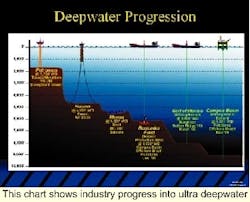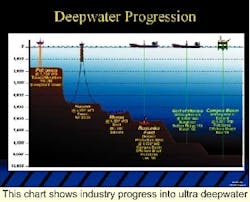Riser development guidelines example of need for standardization in deepwater
As oil and gas exploration and prod-uction moves into greater water depths, advancing technology faster than ever before, the streamlining of the producing companies is negatively affecting the regulatory standards that would document this new frontier. The American Petroleum Institute (API) is challenged by a shortage of volunteers needed to keep industry standards current, and a growing reluctance by companies to openly discuss technology they feel offers a competitive advantage.
Working with regulatory authorities such as the Minerals Management Service, API plans to contribute to advancements in deepwater operating capability. API has labeled this a priority and the MMS is eager to streamline the regulatory process while maintaining safety.
This issue highlights API's long-standing role of working with industry and regulatory groups to promote new technology through the writing of standards and sharing of information. An examination of the history of self-regulation and standard setting in the industry is instructive in what occurs when standards are lacking.
API's regulatory role
The API dates back to the early days of oil drilling in the US. The first well was drilled in 1859; the API was established in 1919. Before that, there were no standards for equipment, which meant that the "wheel" was frequently re-invented for every well. As parts production became an industry, there was a strong drive for standardization. Then, as now, the high costs of wells and equipment stimulated further innovation, which required more industry oversight to maintain minimum quality and reliability for new equipment.
API was developed as a national trade association representing the petroleum industry. Members determine the industry's position on public policy and set standards that govern day-to-day operations worldwide. The API Production Department, established in 1928, works with governments and regulatory bodies to develop responsible and effective laws and regulations. This department develops safe and cost-effective industry operating practices, as well as equipment standards.
Standards are an essential part of any scientific discipline. They provide reliable and interchangeable equipment, allow innovators to share technology, and eliminate redundant efforts by capturing past learning. Standards also record safe operating practices and reduce the need for outside regulation.
Along these lines, the Minerals Management Service (US Department of Interior) has stated it will not establish OCS regulations where appropriate API standards already exist. This illustrates the freedom that self-regulation offers the industry. By contrast, weak standards or areas of new technology that are not adequately standardized leave the door open to government regulation.
New technology
In the early days of offshore oil and gas drilling, the major oil companies heavily dominated the industry. These large corporations did almost everything in house, including research and product development. The organization of these companies did not encourage standards-setting on developing technology. The people who needed to know the standards were working daily with the new technology.
At this time, oil production was dominated by the US, which in the mid-to-late 1940s, accounted for 63% of the free world's oil. This dominance meant the US standards set by API were adequate for operations around the globe.
All this changed in the late-1960s when oil was discovered in the North Sea. The importance of the North Sea, besides being a rather large oil province, was that no national oil companies were involved. As exploration and production in the North Sea sector ramped up, there was greater demand to set standards that reached beyond the shores of North America.
In the mid-1970s, as expertise developed in exploration and production specific to the conditions offshore the UK and Norway, standards were established that challenged API. As other basins around the globe developed, the need for a global standard became very obvious.
In 1989, ISO/TC67 was re-established. API provides the Secretariat of this international group and is working with TC67 to develop global industry standards, but progress is slow. It is proving as difficult to write global standards that incorporate US requirements as it was to write the standards in the first place. In this sense the effort is starting from scratch.
Regardless of who is writing the standards for new technology there are challenges inherent in the effort. By definition, new technology is still evolving. It is not yet established across the industry, so that the ultimate evolution of the technology is not known.
Regulation through setting standards at this point in a technology's evolution may serve the ironic purpose of stifling its natural development. Still, a working process for sharing new technology through global standardization is a worthwhile pursuit.
To do this, the steering committee needs to not only incorporate existing API standards, but those of other standards groups elsewhere. At this point, good progress is being made, but there is still much to do.
New oil industry
The core problem with keeping existing standards up-to-date and putting together new standards is the time and expense involved. In the past, API relied heavily on the generosity of the majors who provided funding as well as expertise. There are no longer a sufficient number of employees at these companies charged with documenting new technology.
Those employees still in place often lack the time or the budget to travel for API committee meetings. These companies have shifted their financial model from corporate funding to business unit funding, which severely restricts the funding of these operations.
This model not only reflects a trimmed down oil industry, but also a profit driver that was not in place before. Currently, employees of the majors say that if what they are doing does not contribute directly to the bottom line of the company, then it will not receive funding or attention. In a period of massive downsizing, it is difficult to expect a high-level employee to make time for non-profit activities, even those as vital as updating API standards.
A further problem is that the same cost reductions that have made qualified personnel less available have also led to more inexperienced professionals managing projects. As early retirement claims an increasing number of seasoned veterans, the concern is that it is increasingly important that the best practices are documented and taught to new comers.
The massive expansion in deepwater exploration and production, and limitations on trained manpower, means that many individuals and companies are working beyond areas of experience. In some cases, deepwater drilling is treated as an extension of onshore or shallow water drilling.
The designs are simply made "bigger and stronger" to deal with the increased weights and pressures of deepwater. Without adequate documentation and standardization, the door is left open to significant failure, and subsequently, outside regulation. A common fear among veteran managers is that once government regulation takes over from standard-setting bodies, it will be a slow and difficult trip to win back regulatory confidence in industry self-regulation and knowledge sharing.

